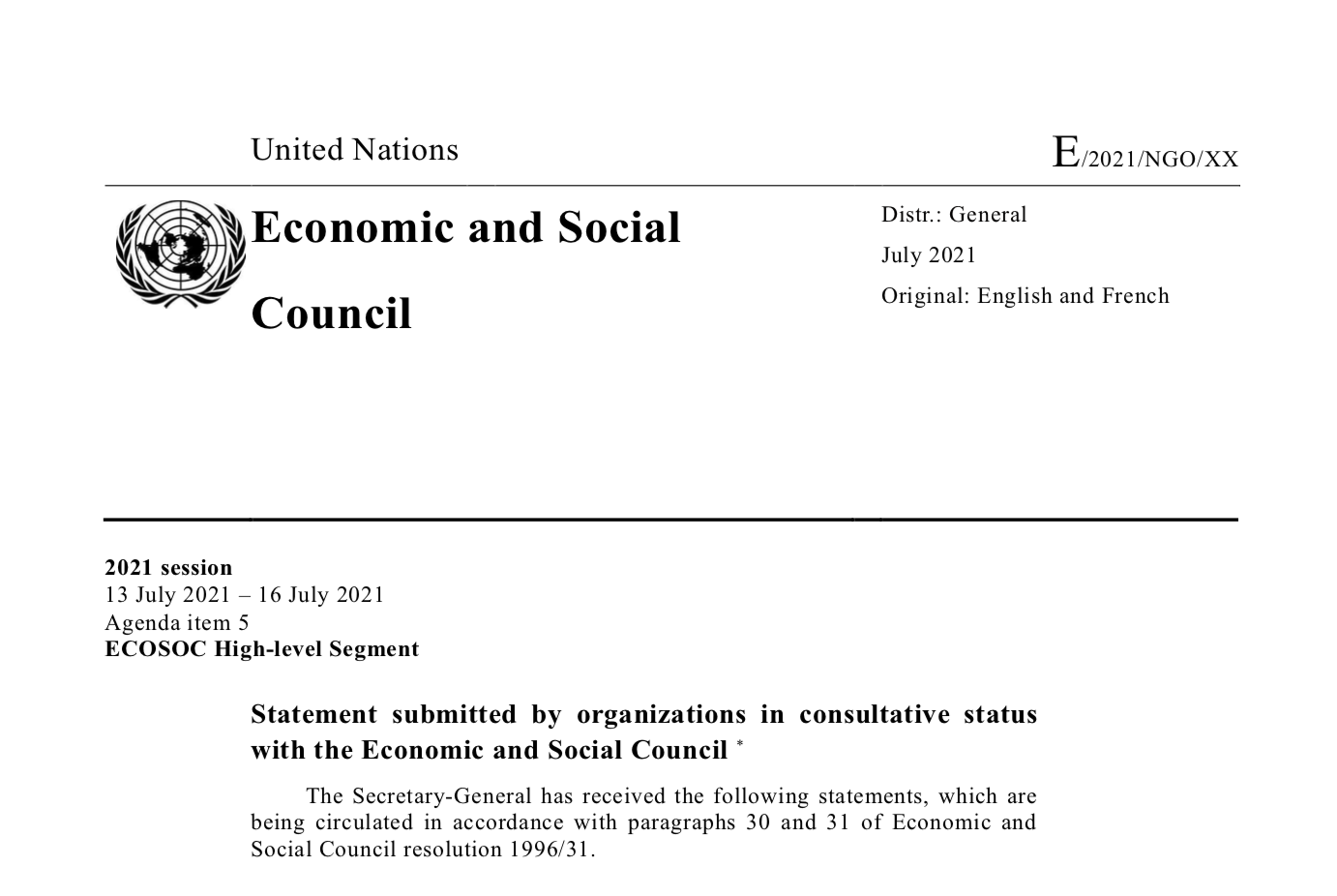The LGW shared its recommendations in the form of the following statement, submitted to the United Nations, translated into its official languages, available to the international delegations.

We, from the Legion of Good Will (LGW), present our recommendations with regard to the theme of the 2021 High-Level Segment of the United Nations Economic and Social Council: “Sustainable and resilient recovery from the COVID-19 pandemic that promotes the economic, social and environmental dimensions of sustainable development: building an inclusive and effective path for the achievement of the 2030 Agenda in the context of the decade of action and delivery for sustainable development.” Since the beginning of the social distancing protocols, in March 2020, the Legion of Good Will, a 71-year-old organization, has intensified its efforts to fight hunger and misery, surpassing, after a year of the pandemic, over 3 million kilos of food and essential items donated to vulnerable families in nearly 200 cities in Argentina, Bolivia, Brazil, Paraguay, Portugal, the United States, and Uruguay.
The long duration of the health crisis, which is exhausting everyone and has generated economic, social, and emotional implications, poses additional problems for the poorer population. As of the closing of this statement, almost 400,000 Brazilians have died due to the pandemic, while some 10 million Brazilians do not even know if they will have a meal the next day according to the Brazilian Institute of Geography and Statistics (IBGE). The total number of citizens who live in extreme poverty tripled between August 2020 and February 2021. Today, this contingent of 27.2 million Brazilians is larger than the entire population of Australia. The research entitled “Favelas and hunger,” carried out by Instituto Locomotiva in partnership with Data Favela and Central Única das Favelas, revealed that 8 in every 10 residents living in peripheral regions in Brazil need donations to survive.
Social assistance in the context of the pandemic
In this challenging scenario, civil society organizations have also been feeling the impact of this turbulence, with an increase in requests for social assistance, although they operate with fewer resources. The Legion of Good Will is one of the organizations that has not missed a single day in providing help for the most vulnerable people in its 94 units, comprised of 81 social service centres, 10 schools, and 3 shelters for the elderly. It also offers guidance by way of its Solidary Society Network, which brings together hundreds of organizations and leaders nationwide and provides courses, consultancy services, and workshops to strengthen and qualify the work they do.
During this health crisis, we have been promoting remote social and educational activities with those we help and distributing non-perishable food baskets, “green” food baskets (with locally produced salad greens), and school supplies, as well as hygiene and cleaning products (including face masks in some cities). Companies from different industries, food banks, the Army, and public bodies, such as the Civil Defense, have embraced this solidary cause.
Donations have reached settlements, favelas, indigenous communities, quilombos [remote settlements originally founded as a refuge by fugitive enslaved people or their descendants], isolated villages in Brazil’s semi-arid region, and other vulnerable places, particularly in the Amazon region, which has been badly affected by the pandemic. Another service provided is the Children: The Future in the Present! program, which has been offering important support to the parents and legal guardians of the kids helped in order to prevent them from toxic stress at this time of social distancing, thus reducing any negative emotional impacts. Carried out by the Legion of Good Will in 63 cities in Brazil, this service for socializing and strengthening bonds seeks to ensure that girls and boys from 6 to 15 years old are socially protected and have access to social and educational actions that promote their full development.
Our team of educators reinvented their teaching practices, planned and made available activities of music, dance, arts, and recreational activities, and cooperative games; this is all being done online until it is safe to resume in-person classes. Using communication and messaging apps, the Organization’s teams across the country sought, even from a distance, to achieve the main goals of this action and provide everyone with moments of interaction and fun.
A major concern of young people is the impact the pandemic is having on the world of work. According to surveys by the Brazilian Institute of Geography and Statistics, the unemployment rate in Brazil (14.2 percent in the quarter ending in January) is the highest since 2012. For people aged between 18 and 24, the rate is more than double the general average (exceeding 30 percent). However, in the four cities where the Legion of Good Will runs its Good Will Apprentice program, which helps place young people in the job market, the Organization has managed to maintain the average number of those being hired.
For the elderly, in the three shelters we operate, in addition to following the recommendations of the official health agencies, we have adopted a series of other preventive actions. Contact between family and friends with the residents, who are part of the group at higher risk from the new coronavirus, for example, is made by video call or telephone. Manual or reflective recreational activities have been carried out outdoors, in the units’ external areas. Others that need to be done inside, such as physiotherapy and meals, respect social distancing protocols.
The temperature and respiratory rate of the elderly are being measured at least three times a day, and if there is any change, the nursing team immediately relocates them to the isolation area for monitoring and additional care. The same goes for employees who have flu-like symptoms and/or a fever; they return home and self-isolate, as instructed by the World Health Organization. All were part of the first groups vaccinated in Brazil.
The Full Life program, which is carried out in 40 cities in the country and is aimed at people over 60 who live alone or with their families, offered follow-up and emotional support by way of communication and messaging apps. Now face-to-face activities and workshops resumed the work that began before the pandemic, maintaining contact with the Organization’s professionals and the bonds established between those who participate in the program on a regular basis.
All these improvements carried out by social workers and representatives of civil society organizations and social movements were the main topic of the LGW’s 25th International Congress on Social Assistance, which took place on November 9-11, 2020. With the theme “The impact of COVID-19 and the future of Social Assistance,” the event collected good practices, which have been made available in English, Spanish, and Portuguese in 12 thematic panels:
– Rethinking the right to play
– Identity and belonging: strategies for maintaining bonds in times of social distancing
– Socializing and strengthening family ties during the pandemic: challenges and possibilities – Multistakeholder actions in Social Assistance
– Social participation in the trans-pandemic period
The Congress also served as an opportunity for strengthening the skills of professionals who work on the front line, where they support the most vulnerable people, who have been suffering from anxiety and breakdown due to the pandemic. As the President of the Legion of Good Will, Paiva Netto, states: “Faced with a wide variety of situations, in which pain and suffering afflict us, often without warning, a gesture of solidarity is essential when providing spiritual and material help for others. Alongside this immediate support, we need to nurture the strength of Hope and of Accomplishing Faith, which drive human beings to remain under the protection of the Heavenly Father and encourage them to roll up their sleeves and turn their fair supplications into a reality.”
Education in the context of the pandemic
In facing up to COVID-19, schools around the world have suspended in-person classes, which presented a challenge that had never been experienced before: remote teaching en masse. In Brazil, whose various regional realities differ enormously, efforts and creativity were needed to bring online learning to the public in the poorest areas. To avoid further problems to students and them dropping out of school, the Organization promptly and diligently acted in order not to leave anyone behind. Our schools distributed learning materials, food baskets, and cleaning and hygiene kits to vulnerable families and supported those who had difficulty accessing the Internet and technology equipment.
The Legion of Good Will also developed educational and teaching tools for the educators, who continued working during social distancing. These were shared during the Organization’s 22nd International Congress on Education, which discussed the theme: “The challenge of remote learning and the post-pandemic school — A view beyond the intellect.” Streamed on the Internet in Portuguese and Spanish, the event took place between June 29 and July 1, 2020, and more than 7,000 participants registered for it from 589 cities in 13 countries: Argentina, Bolivia, Brazil, Chile, France, Luxembourg, Mexico, Paraguay, Portugal, Switzerland, the United States, Uruguay, and Venezuela.
The Congress included talks and workshops on the Organization’s teaching methods, which are based on the Pedagogy of Affection and the Ecumenical Citizen Pedagogy, both created by educator Paiva Netto. The quality education provided by the LGW’s schools enabled, even in the difficult year of 2020, our students to rank high in the Brazilian Science Olympiad and to get into the most competitive university in the country.
During the pandemic, by way of its Boosting Skills program, the Legion of Good Will has also innovated by adjusting their inclusive actions and has continued supporting students who have specific educational needs, such as those with Autism Spectrum Disorder or Down syndrome. The initiative remotely monitors the educational, emotional, and social development of students, proposing strategies that can help them learn the curricular content and have autonomy to carry out everyday activities.
Even with in-person classes suspended, the teachers continued to support the students and provided them with individualized teaching plans, from producing special remote or hybrid lessons to making assistive technologies―in other words, tools, materials, methodologies, or resources, such as games―that are sent to the homes of those who need this support. The multidisciplinary team uses a messaging app to maintain a partnership with family members and exchange information regarding the children’s progress and their real needs.
Science and Faith promoting Hope
In addition to educational and social assistance actions, given the unprecedented suffering being experienced by humanity, the Legion of Good Will has been giving hope to the population; besides providing people with information regarding protection against COVID-19, the Organization has been offering them words of spiritual comfort and support.
It was in this context that the Legion of Good Will held another edition of its Spirit and Science World Forum, which had the following theme: “Science and Faith promoting Hope to overcome the new coronavirus pandemic.” Ten renowned speakers presented their perspectives on the current health crisis, the phenomenon of death, coping with grief, and other issues.
For two decades, the Forum has been bringing together scientists, religious people, and philosophers in a permanent movement of dialogue at the World Parliament of Ecumenical Fraternity, the ParlaMundi, which is located in Brasília, Brazil. In 2000, when Paiva Netto created the Forum, he highlighted its main goals, which are even more urgent today given what we are currently facing: “To reconcile the current knowledge in the physical world with the infinitely broad knowledge, located in the dimension of the Immortal Spirit, in a powerful force at the service of the people. . . . Discord, radicalism, hostilities of all types must remain distant from religious, philosophical, political, scientific, economic, artistic, sporting, and all other debates and propositions, because human beings are born on Earth to live in society, a Solidary, Altruistic, and Ecumenical Society.”
The Legion of Good Will thus reaffirms its belief in the power of dialogue and constructive cooperation for overcoming the impacts of the pandemic, as well as its commitment to the implementation of the 2030 Agenda.

